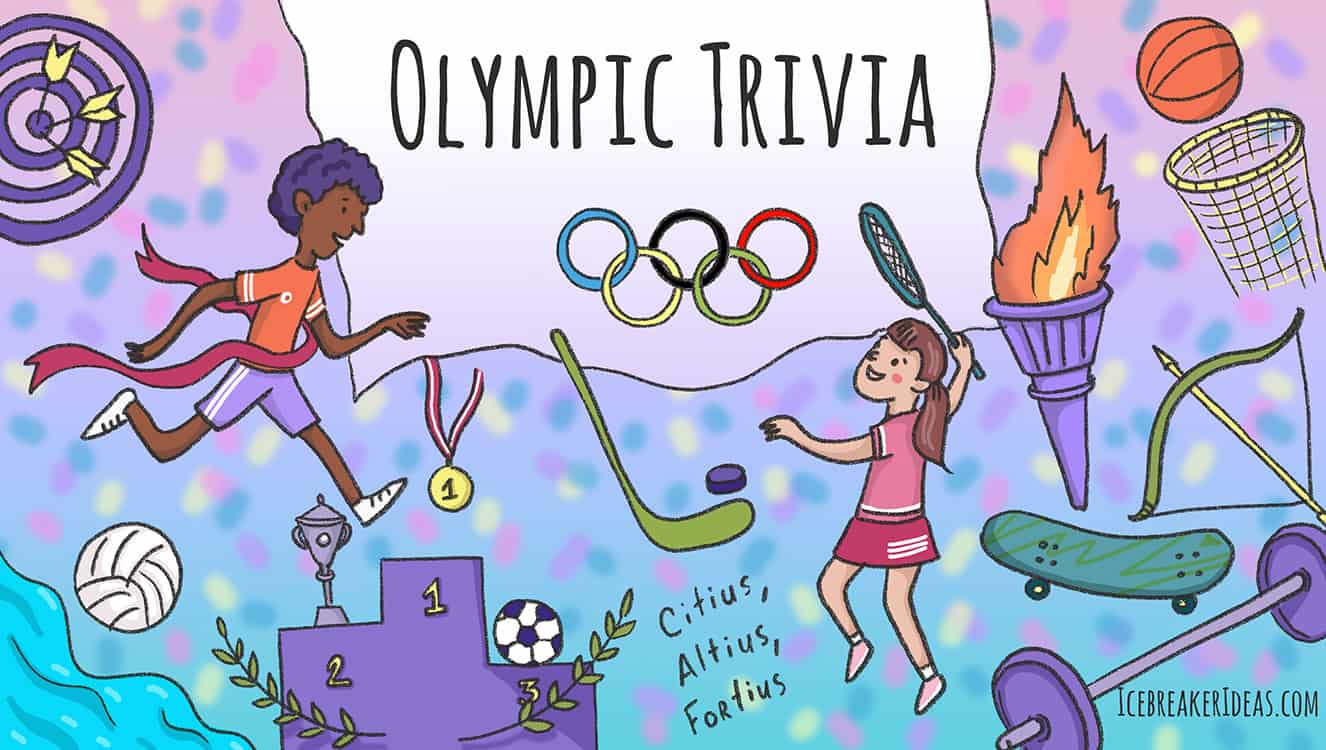Whether you enjoy the Summer Olympic Games, prefer the Winter Olympics, or watch them all, every Olympic Game you see adds additional facts and trivia to your storehouse of Olympic information. In this article, we have provided “Olympic Trivia Facts” about its history, participants, places, and symbols sure to contain some surprises. We have a list of interesting “Olympic Trivia Questions and Answers” perfect for testing your friends and family. The article ends with an “Olympics Quiz” designed to see how much you really know about everything Olympian.
Table of Contents
Olympic Trivia Facts
Olympic History
The history of the Olympics is filled with interesting people and places and provides a foundation for understanding the unique importance of these athletic events. We think you will enjoy these historic highlights covering the origin and growth of Olympic sports.
- The first Olympic Games took place in Olympia, Greece in the 8th century and were held every four years, probably because they lasted five or six months each time.
- Emperor Theodosius I banned the Olympics in the 4th Century along with other pagan festivals. About 1500 years later, they were resurrected.
- What is referred to as the “modern Olympics” began in Greece in 1896.
- A race from Marathon to Athens, Greece was held in the 1896 Olympic Games in honor of Pheidippides.
- Originally, athletes in the ancient Olympic Games competed without wearing clothes. The Greek root gymos means nude, and appears in the word gymnasium. Fortunately, we no longer consider this necessary for participation in the Olympic Games.
- All of the countries except the United States lower the flag as they pass the seated leaders of the host country. The tradition was first stopped by the United States in 1908.
- Only three modern Olympic Games have been canceled. The Summer Olympics were cancelled in Berlin, Germany during World War I (1916). Both the Summer Olympics and Winter Olympics were cancelled during World War II (1940 and 1944). Additionally, the 2020 Summer Olympics were postponed until 2021 due to the coronavirus outbreak.
- The Summer and Winter Olympics now occur on separate cycles and alternate every two years, but from 1924-1992, the Winter and the Summer Olympics took place in the same year.
- During the 1936 Berlin Games, two Japanese pole-vaulters tied for second place and, instead of competing again, they cut the silver and bronze medals in half and fused them together so that each had a half-silver and half-bronze medal.
- Innsbruck was threatened by a lack of snow in 1964, until the Austrian Army delivered 50,000 cubic yards of it.
- In 1979, the United States and 65 other countries boycotted the Summer Olympics in Moscow to protest the Soviet invasion of Afghanistan.
Olympic Participants
Two-hundred-eighty athletes participated in the first modern Olympics. In the Beijing Winter Olympics, 2,871 participated. Our list presents some of the most well-known and innovating participants through the years.
- The first Olympic marathon race, which was twenty-five miles in length, was won in 1896 by Greek water carrier Spyridon Louise.
- Women began participating in the Olympics in 1900.
- The Olympics have not always had only athletes competing. Artists such as writers, musicians, sculptors, architects, and painters participated in the Olympics from 1912 to 1948.
- The first official Olympic mascot, Waldi the dachshund, appeared in Munich in 1972.
- Johnny Weissmuller, often remembered for his role in twelve Tarzan movies, won five swimming gold medals in the 1920s.
- The NBA “Dream Team,” which was the first American team to feature professional players, participated in the Olympics in 1992.
- The first Black athlete who won a medal was George Coleman Poage who won two bronze medals for the 200-meter and 400-meter hurdles in 1904 in St. Louise, Missouri.
- The first Black athlete to win a gold medal in the Winter Olympics was Vonetta Flowers in 2002 in Salt Lake City, Utah.
- The French educator and historian Baron Pierre de Coubertin is referred to as the father of modern Olympic Games, because he founded the International Olympic Committee and was its second president.
- Some of the youngest participants in the Olympics have been:
- Greek gymnast Dimitrios Loundras, who competed in the 1896 Athens Olympics when he was ten.
- At age 13, springboard diver Marjorie Gestring, won a gold medal.
- At fourteen, Kusuo Kitamura was the youngest male gold medal winner for swimming.
- Five countries have participated in every modern-era Summer Olympic Games – Great Britain, France, Greece, Switzerland, and Australia.
Olympic Places
Summer Olympic Games have been hosted by 23 different countries on five continents and the Winter Olympics have been hosted by 12 countries on three continents.
- The Olympics originated in Greece.
- Beijing was the first “Dual Olympic City” to host both summer and winter Olympic Games.
- Five venues (designated domains or locations) from the Beijing 2008 Olympic Summer Games were used for Beijing’s 2022 Olympic Winter Games.
- The first ever skeleton track 180 degree corner of any Olympic Winter Games was at Beijing in 2022.
- Brazil hosted the Summer Olympic Games in 2016, the only South American city to have done so.
- The first and only Latin American city to host the Olympics was Mexico City in 1968.
- The first opening ceremony for the Olympics was held in London in 1908.
- The first winter Olympics Games were held in Chamonix, France in 1924.
- The 1992 Olympic Games in Barcelona, Spain were the first boycott-free Olympics since 1972.
- The Olympic flag first flew in Antwerp, Belgium in 1920.
- The 1904 Olympic Games in St. Louis coincided with the World’s Fair, which created a rather chaotic event.
- The largest city to ever host the Winter Olympics was Turin, Italy.
- In 1992, South Africa participated in the Olympic Games for the first time since 1960.
- The first host city to use artificial snow in the Winter Olympics was Lake Placid, New York.
- The United States has hosted the most Olympic Games and is also the only country to have won a gold medal at every one of the Olympic Winter Games.
Olympic Symbols
Although many of the Olympic Symbols added in the past have remained as part of the Olympic traditions, each time the Olympics are held, a new emblem is chosen. For the Beijing Winter Olympics in 2022, the emblem was inspired by the Chinese character denoting winter. Our list of Olympic Symbols will help you understand the origin and meaning of the more traditional Olympic symbols.
- The Olympic Rings
Designed by Baron Pierre de Coubertin, recognized as the founder of the modern Olympic Games, the Olympic Rings represent the five inhabited continents of the world; Africa, the Americas, Asia, Europe, and Oceana. Every nation has at least one of the six colors in its flag – the white background, blue, black, yellow, red, and green.
- Olympic Medals
Gold, silver, and bronze medals are awarded to Olympic winners. Gold medals are mostly made of silver. They were last made of pure gold for the 1912 Olympics.
- The Olympic Motto
The official motto for the Olympics, “Citius, Altius, Fortius,” means “Faster, Higher, Stronger.”
- The Olympic Torch
For each Olympic Game, the torch is lit in the Greek temple of Hera at Olympia by actresses wearing the costumes of Greek priestesses. To light the torch, a parabolic mirror uses the sun’s rays to kindle flame. It is carried to the Olympic host city by relay runners. However, if necessary for transport, an animal, boat, or airplane might be used. The torch is used to light the Olympic cauldron during the opening ceremony and is extinguished during the closing ceremony.
Olympic Trivia Questions and Answers
The Olympics have always been a historic event, with amazing displays of athleticism and planned pageantry. Additionally, the cultural and sociopolitical conditions surrounding each Olympic season only add to these memorable events. We have a selection of “Olympic Trivia Questions and Answers” to test your Olympic loyalty and memory. See how many you can answer!
- Question: What are the official languages of the Olympic Games?
- Question: Which sport was in the Olympics for the first time since 1924 in 2016?
- Question: In what year was softball introduced to the Olympics?
- Question: In which city were the Olympics suspended for 36 hours after a terrorist attack in Olympic Village?
- Question: Carl Lewis and Jesse Owens both won gold in which four events?
- Question: Schneemann was the official mascot of the Olympic Winter Games Innsbruck 1976. What is the English translation from the German?
- Question: What year saw the debut of table tennis in the Olympic Games?
- Question: In 1968, the Olympic Torch relay followed the path of what historical explorer?
- Question: What three women’s sports debuted in the 1976 Montreal Olympics?
- Question: Which city withdrew its bid to host the 1976 Winter Olympics, which were then held in Innsbruck?
- Question: What animal was sacrificed by the ancient Greeks at the conclusion of the Olympic Games?
- Question: Which five sports were combined for the ancient pentathlon event of the Olympics?
- Question: Where were the first smoke-free Olympic Games held?
- Question: Where and when was the first women’s marathon held in the Olympic Games?
- Question: The Olympic Games were first viewed on mobile devices in which year?
- Question: Which Greek god did the first Olympics honor?
- Question: Which American host city did the Soviet Union boycot?
- Question: In what year were the triathlon and taekwondo added to the Olympics?
- Question: What was the name of the Beijing 2022 Olympic torch?
- Question: In what year did snowboarding make its Olympic debut?
- Question: When was electronic timing first used time for the Olympics?
- Question: Who broke Mark Spitz’s record for the most gold medals in swimming at the 2008 Olympics?
- Question: Which country was the men’s soccer team from that didn’t give up a single goal to their opponents in 2004?
- Question: Who was the People’s Republic of China’s first ever champion at the Olympic Winter Games to win the women’s 500m short track gold at Salt Lake City 2002?
- Question: Where were the Winter Olympic Games first broadcast in color?
Olympics Quiz
If you have read all of the previous portions of this article, you should be ready to test yourself on how much you know. Our “Olympics Quiz” will let you show your friends your extensive knowledge of the Olympics. Use our quiz for a trivia game or as an icebreaker when you gather with friends to watch the Olympics.
Questions:
- What was the name of the Greek goddess who was the only married woman permitted to watch the ancient Greek Olympics?
- Who is reputed to be the first-known Olympics winner in ancient Greece?
- Who was the ancient Greek mythical figure said to have founded the Olympics?
- When were the first known Olympic Games held?
- Where were the first modern Olympic Games held?
- How often were the first Olympic Games in Greece held?
- What prize was given to winners of the Olympics in ancient Greece?
- In what year were the first modern Olympics held?
- In which city is the Olympic Torch lit where each year?
- What does the Olympic Torch light and where?
- The first official mascot of the Olympics was what breed of dog?
- What colors are the Olympic rings?
- When did the Olympics first award gold (first), silver (second), and bronze (third) medals?
- Name the four new sports debuted at the 2021 Olympic Games in Tokyo.
- What is the name of the city which hosted the Olympics three times?
Well, now you should have a great deal of knowledge about everything surrounding the Olympics and those who participate. We hope you have enjoyed this Olympic trivia article and will share it with your friends and family so that they, too, can know all about both the Summer and Winter Olympics. Enjoy!
Susan majored in English with a double minor in Humanities and Business at Arizona State University and earned a Master’s degree in Educational Administration from Liberty University. She taught grades four through twelve in both public and private schools. Subjects included English, U.S. and world history and geography, math, earth and physical science, Bible, information technologies, and creative writing.
Susan has been freelance writing for over ten years, during which time she has written and edited books, newspaper articles, biographies, book reviews, guidelines, neighborhood descriptions for realtors, Power Point presentations, resumes, and numerous other projects.



